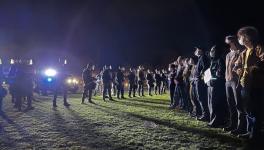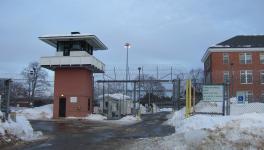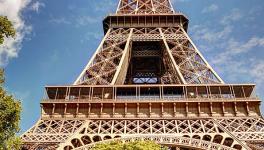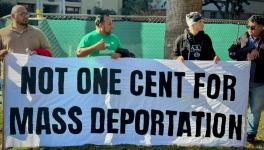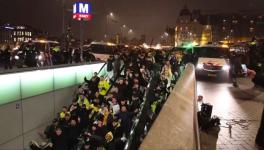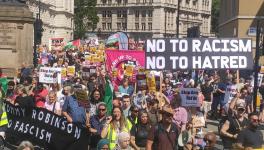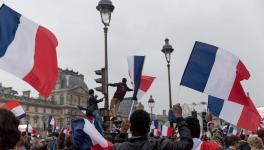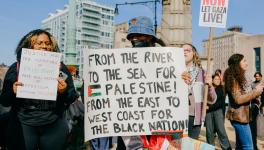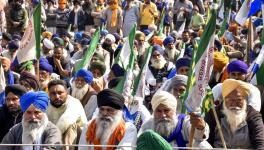US: When Killer Cops Evade Accountability, Victims’ Families Find Other Paths for Justice
John Collado's daughter holds a street sign named in her father's honor, surrounded by family members of victims of police brutality (Photo: ANSWER Coalition)
On March 25, dozens of family members, neighbors, and activists from across the country packed into a restaurant on Dyckman Street in Inwood, New York City. They were celebrating the life and legacy of John Collado, a beloved community member and a victim of police brutality, who that day was to have a street named after him in the same location that he died.
On September 6, 2011, NYPD officer James Connolly shot 43-year-old grandfather John Collado in the stomach, just outside of Collado’s apartment. Hours later, Collado died of his injuries.
Those reading local NYC media at the time would soon learn that Collado was allegedly a professional wrestler, had placed Connolly into a chokehold, and “lifted the cop more than a foot off the ground,” nearly causing him to lose consciousness. Collado had gotten in between Connolly and a drug dealer and “came to the aid of the dealer,” according to the New York Post. Not surprising, considering that according to the NYPD, Collado “had prior arrests associated with narcotics.”
Except, none of the above is true.
Although Connolly had testified that Collado had put him in a headlock and lifted him off of the ground, and that he feared for his life, video footage, eyewitness reports, and even Connolly’s own partner contradicted those claims. In a 2018 civil trial, Connolly was found to have lied on the witness stand, and a jury awarded Collado’s family USD 5.5 million. Connolly was never punished for his perjury.
Collado was far from the violent criminal he was smeared to be. Collado did not have prior drug-related arrests. According to family members, John respected the police. Further, wrestling was nothing but a hobby for him, a hobby which was “totally divorced from the reality of who John was,” according to his family’s lawyer.
That evening in September 2011, Collado had seen two men fighting on his block: undercover plainclothes officer James Connolly (who Collado did not know was police) and his neighbor Rangel Batista. Connolly, who was in the narcotics division, had recklessly tried to apprehend Batista without his partner, for an alleged marijuana sale (an act which would not be illegal in NYC today). Batista was later apprehended and no drugs were found on his person. Collado had tried to intervene in Batista and Connolly’s fight after a woman told him she had seen the two men “trying to kill one another”.
“That’s what my uncle was about, helping out others,” Collado’s nephew, Joshua Lopez, told Peoples Dispatch. “That’s why he got in between two people that he saw fighting to try to do something good.”
When Collado intervened, he tried to separate the two men, according to witnesses. According to Connolly’s partner, Collado had both hands on the officer’s shoulders when Connolly pulled out his gun and immediately shot the grandfather without warning, according to witnesses.
Collado lay moaning in pain on the ground, bleeding out from a fatal stomach wound while Connolly was rushed to the hospital for minor injuries, including a “little bit of redness on the outside of my cheeks.” Police prohibited Collado’s family, including his wife, from attending to him, and delayed medical attention. Police also delayed the ambulance taking Collado to the hospital. Collado’s niece, Banayz Taveras, would later win a suit against the city because police blocked her from rendering first aid to her uncle as he lay on the ground. She claimed that she was beaten, verbally abused, and detained for over 24 hours by police.
Police prohibited Collado’s family members from seeing him at any point, even in the hospital, up until he died in the early morning hours of the next day. As the family waited in the hospital lobby, an NYPD officer asked questions about Collado’s background. One family member mentioned that Collado liked to wrestle. The NYPD did not hesitate to use this information to smear Collado in the press: the next day, the New York Daily News headline read, “Former professional wrestler shot by NYPD cops.”
“If you hear a professional wrestler choking a cop, it seems like this cop has no other option but to shoot and defend himself,” Lopez told Peoples Dispatch. “The media and the NYPD collaborated around this story to make John look like a threat.”
In reality, Collado was “always friendly with everybody or always in a good mood,” said Lopez. “I don’t ever remember seeing my uncle angry.”
A recent article by The Independent revealed how James Connolly used his connections to NYPD higher-ups to successfully evade accountability for not only his murder of Collado, but also for a murder he committed less than three years prior. Anthony Roman was 18 years old when Connolly shot him while the officer was on an undercover narcotics assignment. Connolly was never held accountable for this killing, in fact, he won two awards for it. In 2015, then-mayor of New York Bill DeBlasio presented Connolly with the second-highest award in the NYPD for shooting Anthony Roman, an award given for acts of “extraordinary heroism”. In November 2022, Connolly retired early from the police force with a generous pension. He never faced any consequences for the murder of two people.
While Connolly was evading accountability, Collado’s family members were fighting tooth and nail for justice. When Connolly received yet another NYPD award in 2015, Collado’s family protested outside of the ceremony. For their efforts, they were photographed by officers with telephoto lenses, signifying that police were keeping close tabs on the family. Joshua Lopez reports being directly harassed by the NYPD for fighting for his uncle. “Cops have come into my neighborhood and asked my friends, ‘Where’s the terrorist at?’” Lopez said, claiming that police had referred to him as a terrorist. “They constantly kept coming inside of my neighborhood looking for me while I was hanging out in front of my building.”
Lopez described being arrested at a peaceful protest on June 4, 2020, during the height of the anti-police brutality movement following the death of George Floyd. Police already know who he was, which unsettled Lopez. One officer even said to him, “I can’t wait till the day I testify against you.” Police denied Lopez his insulin for 16 hours after arresting him.
Despite this, Lopez and other family members have not stopped fighting. When Connolly was able to successfully avoid justice through official city channels, the family turned to local activists for help.
“I want his memories and legacy to always live on”
Joshua Lopez told People’s Dispatch that he wants NYPD officers to walk by the intersection of Dyckman and Post, where Collado was shot, and remember what one of their colleagues did.
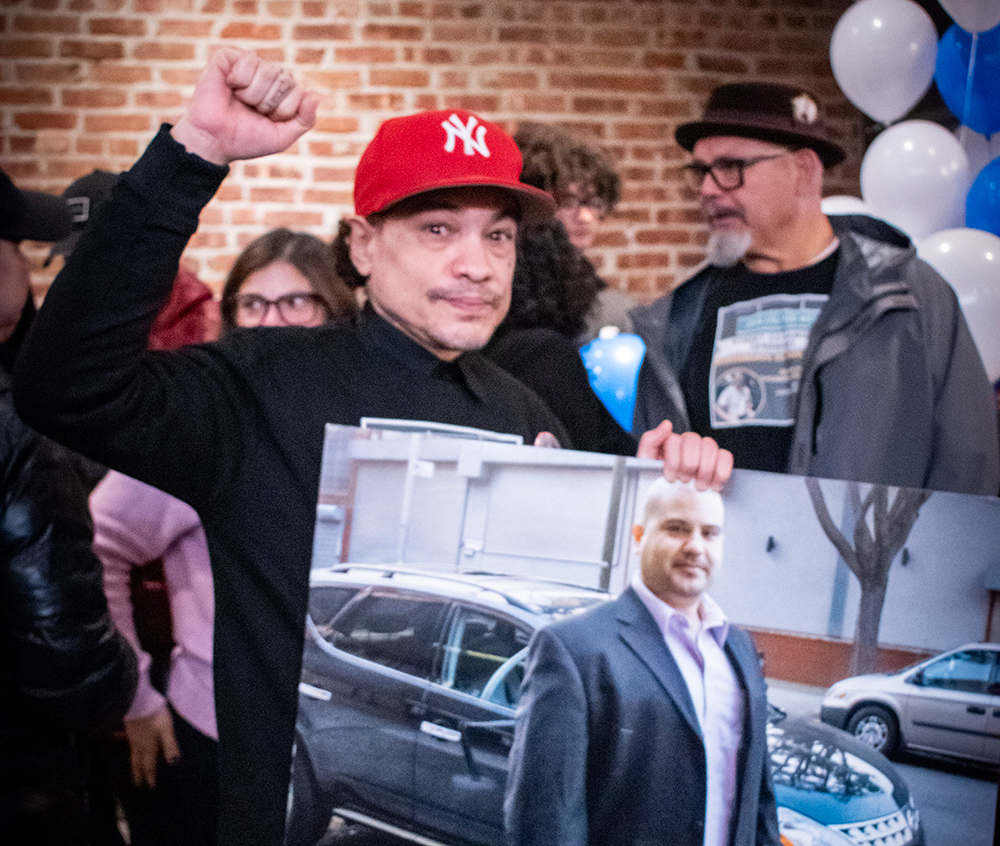
Joshua Lopez holds up a photo of his uncle, John Collado, at the street naming ceremony
“I want families to know and understand that this process could take years and it can be very draining,” Lopez said of the street naming process. “But I want folks to never give up and never give up on your loved ones, never give up on your community.”
“It’s been 11 and a half years already, so years go by. And not intentionally, but people might forget. There might be a new murder that just happened that is making national news. So they might forget the ones of the past.”
“And I never want that to happen with my uncle. And I want his memories and legacy to always live on,” Lopez said.
Kerbie Joseph, born and raised in Crown Heights, Brooklyn, and a longtime anti-police brutality activist, has successfully led campaigns to name streets after two other prominent figures in the movement against police terror. Akai Gurley, who was 28 when he was shot dead in his girlfriend’s apartment building, by a cop who was doing an illegal “vertical patrol”, is now honored with an “Akai Gurley Way” in his home of East New York. A vertical patrol is a police tactic commonly deployed in low-income public housing, in which officers go up and down the stairs of a high-rise apartment complex, looking for anyone deemed “suspicious,” a practice which targets working class Black young men in particular.
Nicholas Heyward Sr. began a decades long fight against police brutality after his son, Nicholas Heyward Jr., was killed by a cop also performing a vertical patrol as the 13-year-old was playing “cops and robbers” with a toy gun. Heyward Sr., who died at 61, is honored with “Nicholas Heyward Sr. Place” outside of the apartment complex where he lived his whole life and where his son died.
Both street names are a result of campaigns launched by family members of victims of police brutality, as well as Kerbie’s initiative combined with a dedicated team of local activists.
Donna Heyward, Nicholas Heyward Sr.’s widow, said that the exhausting fight to hold his son’s killer, NYPD Officer Brian George, accountable, was what ultimately killed her husband at age 61. “His death came about because of suffering from the loss of his son. For fighting all them years,” Heyward told Peoples Dispatch. “Over 25 years he was fighting for justice for something that he never received. That killed my husband.”
Now Heyward Sr.’s name is immortalized at the intersection of Baltic and Hoyt Streets in Brooklyn, New York. Donna Heyward said that whenever someone in the community was murdered by police, Nicholas was “the first one on site to greet the parents and tell them that they were not alone.”
Street namings are “one of the ways that they can have their loved one’s memory live on to remind the community that an injustice was committed in this area,” Joseph told Peoples Dispatch. “It’s also a sign of resistance,” she continued.
“Instead of having a street named after a slave owner, after a capitalist, after a white supremacist, and all over New York City, that’s what a majority of our streets are named after,” it’s significant “to have [a street] named after someone who mattered to the community, after someone who represents a struggle that we fight for every day.”
Lopez wanted his uncle’s memory to live on, in the face of the lies about him published in the media. He turned to Joseph for help in securing “John Collado Way” in Inwood.
“I kind of knew it was going to be hard to get justice”
Lopez knew about the realities of police brutality, like many working class people in New York City, even before his uncle died. “As a kid, I got myself into a lot of trouble and all that,” he said. He was incarcerated at the age of 15, after which he “tried to live [his] life a different way and do what’s better.” Growing up, Lopez had heard of Anthony Baez, who was choked to death during an arrest in 1994, and Amadou Diallou, shot 19 times by police in 1999. “I never heard of cops being held accountable before my uncle was murdered,” Lopez said. “So I kind of knew it was going to be hard to get justice or accountability.”
Indeed, the Collado family’s horrific tale of police murder followed by medical neglect, police harassment, smearing in the media, and a complete refusal of the city or the NYPD to seriously seek justice, is not an exception. In the United States, this experience is the rule.
Since 2015, over 5,000 people have been shot by police (not counting other forms of police murder). And yet, as far back as 2005, at least 140 officers have been arrested on murder or manslaughter charges relating to on-duty shootings, and only 5% of those arrests (seven cops in total) have been convicted for murder, as of 2021.
This is not accidental. Police lobby viciously against accountability measures, as in New York, where the Police Benevolent Association spent $127,000 to unsuccessfully lobby against a measure that would give more power to the Civilian Complaint Review Board (CCRB), the NYPD civilian oversight agency.
The term “blue wall of silence” has been coined to describe the nationwide phenomenon of police refusing to report each other’s crimes, or otherwise attempt to hold their fellow officers accountable in cases of police brutality. On the rare occasion that police do break their silence or try to prevent cases of police brutality, they are severely punished for it. Cariol Horne was fired from the Buffalo Police Department and lost her pension after she stopped a fellow officer from choking someone during an arrest. Only after 15 years of public outrage did Horne receive her pension and the backpay she was owed. Chicago police officer Shannon Spalding was threatened and had her car tires slashed for building a case against corrupt officers in the force.
On Saturday, a crowd including many who had also lost loved ones to police brutality cheered as the sign marking “John Collado Way” was revealed at the intersection of Dyckman Street and Post Ave. Some had traveled as far as California to attend the ceremony. Peoples Dispatch spoke to Marion Gray-Hopkins of the Coalition of Concerned Mothers, who had traveled from Washington, DC. A Prince George’s County police officer had killed her son, Gary Hopkins Jr., in 1999, under very similar circumstances as John Collado—Hopkins was also trying to break up a fight.
“Gary had attended a party that night and one of his friends had gotten into an altercation with someone else at the party. Gary was a peacemaker that night, breaking up the fight,” Gray-Hopkins told Peoples Dispatch. It was then that two off-duty officers, Brian Catlett and Devin White, confronted Hopkins. The two officers had already gotten into a confrontation with him 15 months earlier. Catlett had struck one of Hopkins’ friends, which Hopkins said he had no right to do. Catlett had responded, “Shut up or you’ll get some of the same.”
That night on November 27, 1999, Catlett shot Hopkins fatally. According to Gray-Hopkins, not only was Catlett never held accountable—his murder of Hopkins caused him to get a promotion for a “good kill,” Gray-Hopkins said.
John Collado’s streetnaming meant a lot to her, as a mother of a victim of police brutality. “Everybody will know by coming to the street and seeing that sign that John Collado is being recognized for the hero that he was,” she said.
Get the latest reports & analysis with people's perspective on Protests, movements & deep analytical videos, discussions of the current affairs in your Telegram app. Subscribe to NewsClick's Telegram channel & get Real-Time updates on stories, as they get published on our website.









